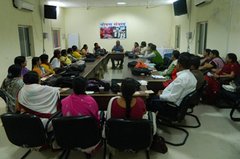Vikas Samvad, a POSHAN knowledge mobilization partner, organized a division-level meeting in Gwalior, Madhya Pradesh where the challenges and successes of working to reduce malnutrition in India were discussed.

Knowledge Mobilization meeting in Gwalior in progress/Photo credit: Vikas Samvad
Held at the Regional Media Resource Centre of the Department of Women and Child Development (WCD), the meeting attracted attendees from five districts: Murena, Bhind, Datia, Shivpuri, and Gwalior. Among the distinguished meeting participants were Shri Suresh Tomar, the Joint Director of WCD in Gwalior District, two District Project Officer (DPO), six Child Development Project Officers (CDPOs) , six supervisors, and seven Anganwadi Workers (AWW).
Opening the meeting, Shri. Tomar recognized the key role of AWW and the need for them to play an even bigger role in raising nutrition awareness at the community level. He said that the focus of ICDS (Integrated Child Development Services) program has been on food distribution, however, ICDS must work towards developing AWWs’ communication skills so they can engage community leaders, mothers, and especially men, in discussions around nutrition.
Mr. Sachin Kumar, from Vikas Samvad, said that despite difficulties there are approximately 1.34 million Aanganwadi Centres (AWC) and 1.27 million AWWs to address the problem of malnutrition. He emphasized that while new research evidence on reducing malnutrition abounds, it is not reaching the grass roots level, where it can be applied.
Some discussion revolved around the Take Home Ration (THR) program. Rations of food and cooking oil intended for children under two years old are distributed to families to combat malnutrition. However, without demonstrating the importance of nutrition and the purpose of the program to families who do not consider malnutrition a problem, the entire ration is being cooked and consumed in a single sitting by both children and adults in many households.
Initially, meeting participants felt that some parents were not concerned about the health of their children. However, after one attendee shared the story of a mother who kept a piece of iron to protect her malnourished child from the evil eye, participants agreed that many parents don’t believe their children are in any danger unless they have observable symptoms, like a fever. Gender dimensions can further complicate the situation; if other family members, like the father, do not support a mother’s concerns, it will be difficult for the mother to proceed with any further action.
Attendees unanimously agreed that the chief problem they faced were ever-changing implementation activities and strategies. The AWW, for instance, are given additional duties like raising voter awareness, counting village animals, conducting economic surveys, etc. which compete with the time they are able to address malnutrition. Some participants felt the program has moved away from the ICDS focus of addressing malnutrition.
Mr. Kumar asked if attendees have a forum where they regularly discuss ICDS program implementation. Participants agreed that they lack a platform on which to share experiences, and that an environment, where officials and staff at different levels of the program are able to ask questions, identify problems, and discuss possible solutions, potentially on topics outside of ICDS, would be helpful. While it was recognized that not every problem has a solution, the ability to call upon a technical expert, would still be highly valued. Participants did not propose a specific platform, but did suggest that regular meetings between representatives from all levels would enable a Question & Answer-type discussion.
Further discussion concerned the initiatives offering toll-free phone numbers which ICDS functionaries can call when they have questions on issues they address while implementing the ICDS program. Participants agreed some problems cannot be addressed through hotlines, and one attendee described an Anganwadi Resource Centre in Andhra Pradesh which is developing documentation on various innovative initiatives.
Finally, successful AWC and AWW were shared. An example of an AWC from a place called Atri (district Balaghat, Madhya Pradesh) was shared where the AWW delivered her duties very well and had a great acceptance in the community. The AWW even got recognized in a district level program meeting.
It was suggested that such examples must be documented and shared with all the ICDS functionaries to learn and adopt from the successes of their counterparts. The documentation can be further shared at the State level and national level for inter-district and inter-state learnings.


